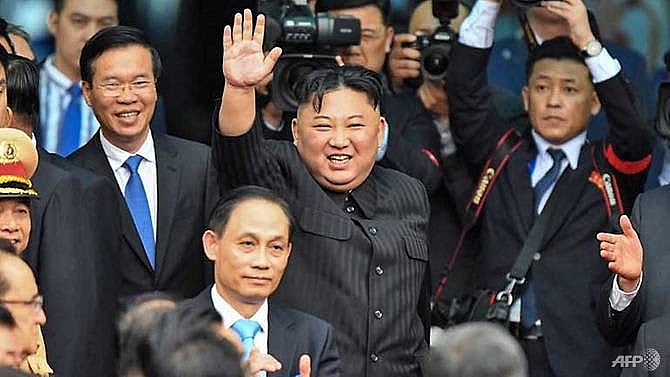North Korea's Kim arrives home after Trump summit
 |
| North Korea's leader Kim Jong Un (centre) waves before boarding his train at the Dong Dang railway station in Lang Son, Vietnam, on Mar 2, 2019. (YE AUNG THU/AFP) |
Kim's return to Pyongyang marked the end of an epic 4,000-kilometre journey - on board his olive green armoured train - from Vietnam, where his much-hyped second summit with Trump came to an abrupt halt last week.
His talks with the US leader were followed by an official visit to Vietnam, with Kim paying tribute to the country's late revolutionary leader Ho Chi Minh.
"Kim Jong Un ... arrived at home on Tuesday after successfully wrapping up his official goodwill visit to the Socialist Republic of Vietnam," the official KCNA news agency said.
"At 3 o'clock in the early morning, his train entered the railway station yard" in Pyongyang, KCNA said, adding that senior officials "greeted him with their ardent congratulations".
A smiling Kim boarded his train at the Dong Dang border station in Vietnam on Saturday, waving to crowds at the station. His route through China was not known, nor was it clear whether he would stop to meet President Xi Jinping along the journey - although it now appears that he did not.
Earlier on Saturday, Kim made a highly unusual stop at the stark concrete monument where the body of Vietnam's independence hero Ho Chi Minh is on display.
NO DEAL IN HANOI
On historic North Korean anniversaries, Kim regularly pays tribute to his predecessors, his father Kim Jong Il and grandfather Kim Il Sung, at the sprawling memorial palace on the outskirts of Pyongyang where their preserved remains lie in state.
But he is not known to have previously done anything similar for a foreign leader.
Kim's trip to Vietnam was the first by a North Korean leader since 1964, when Kim Il Sung also travelled by rail for his journey to the southeast Asian nation.
Talks between Kim and Trump in Hanoi finished abruptly, with a signing ceremony scrapped after the pair failed to reach an agreement on walking back North Korea's nuclear programme in exchange for sanctions relief.
In the aftermath, each sought to blame the other's intransigence for the deadlock.
Trump insisted Pyongyang wanted all sanctions imposed on it over its banned weapons programmes lifted, and that this was a bridge too far.
But in a rare late-night press briefing, the North Korean foreign minister said Pyongyang had only wanted some of the measures eased, and that its proposal to close "all the nuclear production facilities" at its Yongbyon complex was its best and final offer.
Despite the stalemate, both sides said they were open to further talks, though a third summit has not been scheduled.
What the stars mean:
★ Poor ★ ★ Promising ★★★ Good ★★★★ Very good ★★★★★ Exceptional
Related Contents
Latest News
More News
- Russian President congratulates Vietnamese Party leader during phone talks (January 25, 2026 | 09:58)
- Worldwide congratulations underscore confidence in Vietnam’s 14th Party Congress (January 23, 2026 | 09:02)
- Political parties, organisations, int’l friends send congratulations to 14th National Party Congress (January 22, 2026 | 09:33)
- 14th National Party Congress: Japanese media highlight Vietnam’s growth targets (January 21, 2026 | 09:46)
- 14th National Party Congress: Driving force for Vietnam to continue renewal, innovation, breakthroughs (January 21, 2026 | 09:42)
- Vietnam remains spiritual support for progressive forces: Colombian party leader (January 21, 2026 | 08:00)
- Int'l media provides large coverage of 14th National Party Congress's first working day (January 20, 2026 | 09:09)
- Vietnamese firms win top honours at ASEAN Digital Awards (January 16, 2026 | 16:45)
- ASEAN Digital Ministers' Meeting opens in Hanoi (January 15, 2026 | 15:33)
- ASEAN economies move up the global chip value chain (December 09, 2025 | 13:32)

 Tag:
Tag:




















 Mobile Version
Mobile Version